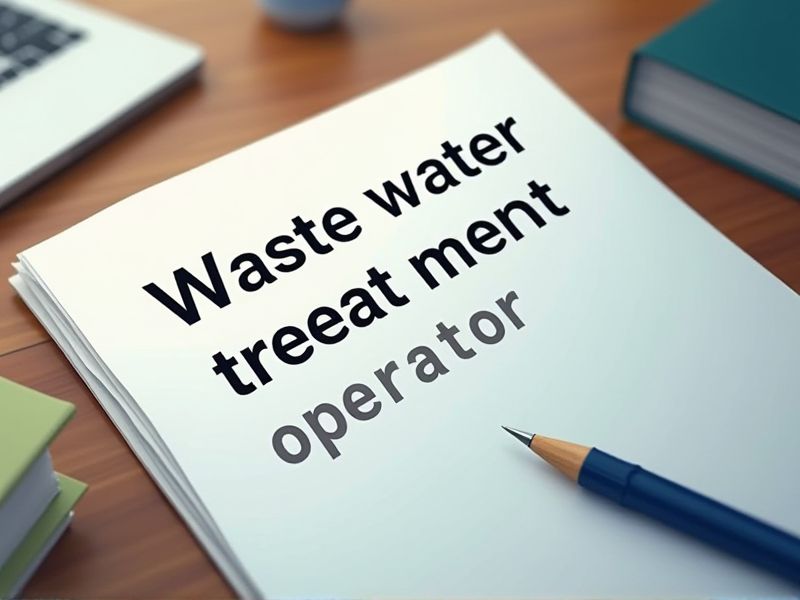
Wastewater treatment operators manage complex systems that ensure water is cleaned to meet safety standards before being released back into the environment. Certifications are critical as they verify an operator's knowledge and competency to handle challenging scenarios. Regulatory bodies necessitate such certifications to maintain public health and environmental protection. Key certifications required for wastewater treatment operators include those validating safety procedures, equipment proficiency, and regulatory compliance knowledge.
State Certified Wastewater Treatment Plant Operator License
State Certified Wastewater Treatment Plant Operator Licenses ensure that operators possess the necessary knowledge and skills to manage complex treatment processes, which can prevent public health risks associated with improperly treated water. The certification serves as a standardized measure of competency, reducing errors and ensuring consistent quality in water management practices. Regulatory compliance is often mandated by state and federal laws, requiring operators to hold such licenses to guarantee accountability and responsibility in safeguarding environmental and public well-being. The licensing process typically involves rigorous training and examination, which helps operators stay informed about the latest technologies and regulations in the wastewater treatment industry.
Advanced Wastewater Treatment Operator Certification
Advanced Wastewater Treatment Operator Certification ensures that operators possess the required knowledge to handle complex treatment processes efficiently. More stringent environmental regulations necessitate operators with specialized skills to maintain compliance. Certified operators can optimize treatment methods, thereby reducing operational costs and environmental impact. The certification provides a competitive edge and career advancement opportunities for operators in the industry.
Basic Wastewater Treatment Operator Certification
Basic Wastewater Treatment Operator Certification ensures operators possess essential knowledge and skills to handle treatment processes efficiently. Certification minimizes risk of environmental contamination, safeguarding public health and ecosystems. Regulatory bodies require certified operators to comply with legal standards and operational safety. This certification enhances an operator's credibility, increasing employment opportunities in the wastewater management field.
Confined Space Entry Certification
Confined Space Entry Certification ensures the safety of wastewater treatment operators by equipping them with the knowledge to handle hazardous environments. Wastewater treatment facilities often contain areas with limited ventilation, which can lead to the accumulation of toxic gases. Proper certification minimizes the risk of accidents, injuries, or fatalities by teaching operators how to assess and mitigate these dangers. Compliance with regulations and safety standards is achieved, which protects both the operators and the facility.
OSHA 10-Hour Safety Certification
Wastewater treatment operators face numerous hazards, including exposure to harmful chemicals and potential biohazards, making OSHA 10-Hour Safety Certification essential for understanding and mitigating these risks. Proper knowledge of safety protocols helps reduce workplace incidents and ensures compliance with regulations, protecting both operators and the environment. The certification provides foundational training in recognizing safety hazards, which enhances operational efficiency and reduces downtime related to accidents. Employers that mandate this certification demonstrate a commitment to a safe working environment, potentially lowering liability and insurance costs.
Hazardous Materials Awareness Certification
Wastewater treatment operators handle various chemicals that can be hazardous, requiring awareness to ensure safety and prevent health risks. Certification ensures operators are knowledgeable about identifying, managing, and disposing of hazardous materials properly. By being certified, operators can minimize the likelihood of chemical spills, leaks, or exposure incidents. Regulatory compliance is achieved by having certified personnel, which can prevent legal issues and potential fines for treatment facilities.
First Aid and CPR Certification
Wastewater treatment facilities pose potential hazards, and First Aid and CPR certification equips operators to respond to emergencies quickly, minimizing risks to personnel safety. The presence of toxic chemicals and heavy machinery increases the likelihood of injuries, necessitating immediate and effective medical response. Certification in CPR allows operators to provide life-saving support during cardiac emergencies, bridging the gap until professional medical help arrives. Regulatory bodies often require health and safety certifications to comply with occupational safety standards, ensuring a safe working environment.
Water Quality Sampling and Analysis Certification
Water quality sampling and analysis certification ensures wastewater treatment operators possess the necessary skills to accurately assess water conditions, leading to improved system performance. Proper certification is linked to the reduction of contaminants, which mitigates environmental pollution and safeguards public health. Continuous monitoring and analysis permit operators to promptly identify and address potential issues, maintaining compliance with regulatory standards. The certification supports consistent treatment processes, thereby optimizing operational efficiency and cost-effectiveness.
Process Control and Instrumentation Certification
Certification in Process Control and Instrumentation ensures waste water treatment operators have the necessary expertise to maintain efficient and safe operations. Without proper control and instrumentation skills, operators may mismanage critical system parameters, leading to environmental harm or regulatory fines. Certification validates the operator's ability to use technology and data to optimize treatment processes, resulting in resource conservation. A certified operator is better equipped to troubleshoot system malfunctions, minimizing downtime and maintaining treatment efficacy.
Environmental Management Systems (EMS) Certification
Securing Environmental Management Systems (EMS) certification enables wastewater treatment operators to systematically improve their processes, thereby reducing environmental impact. Certification often results in enhanced regulatory compliance, as operators adhere to environmental laws and standards more effectively. It can also improve operational efficiency, leading to cost savings through resource management and waste reduction. The certification promotes stakeholder trust by demonstrating a commitment to environmental responsibility and sustainability.
Summary
When you obtain waste water treatment certifications, your expertise and credibility in the industry are enhanced, leading to better job opportunities. Employers are likely to recognize your skills, potentially resulting in increased responsibilities and higher wages. Certified operators often contribute to more efficient and compliant plant operations, reducing environmental impact and operational costs. This combination of factors elevates the overall standards and effectiveness of wastewater management systems.
